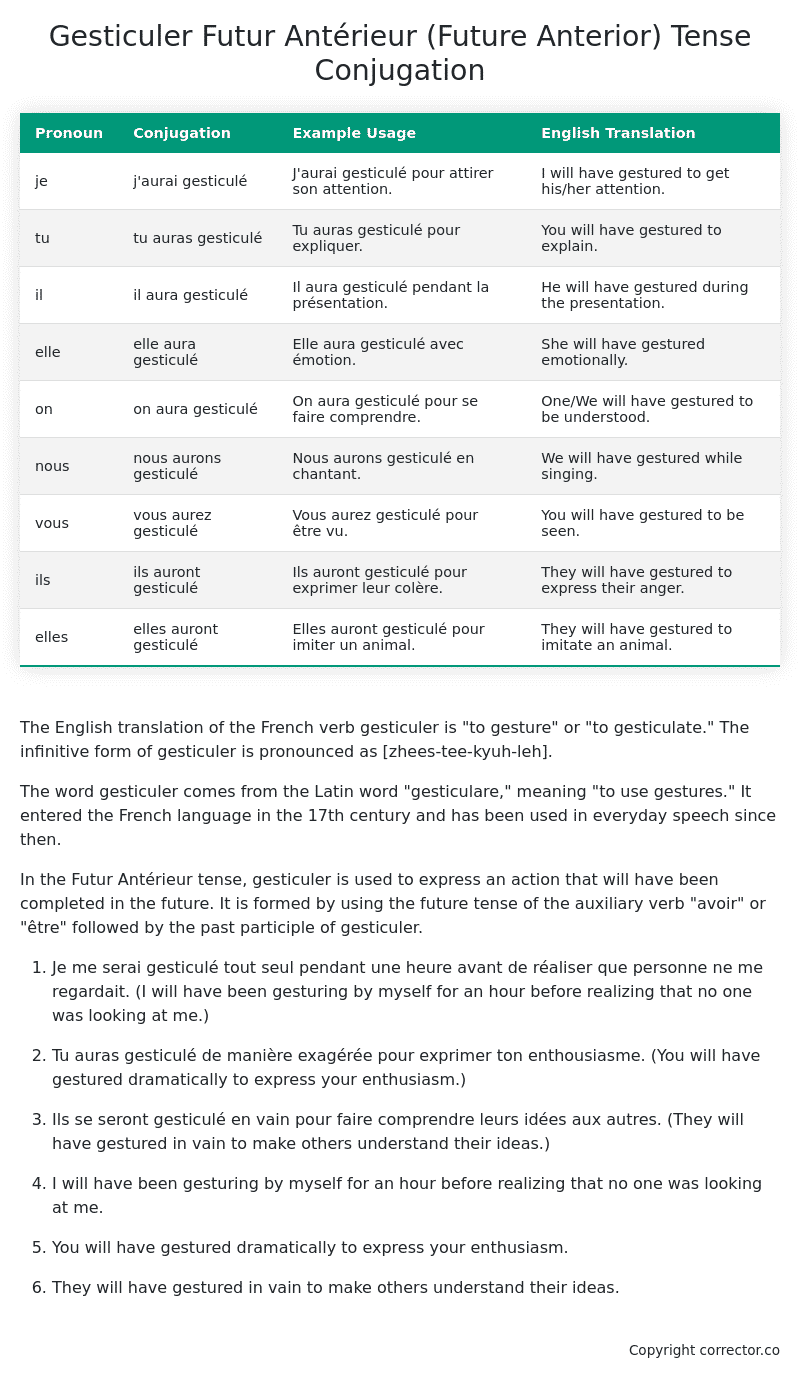Futur Antérieur (Future Anterior) Tense Conjugation of the French Verb gesticuler
Introduction to the verb gesticuler
The English translation of the French verb gesticuler is “to gesture” or “to gesticulate.” The infinitive form of gesticuler is pronounced as [zhees-tee-kyuh-leh].
The word gesticuler comes from the Latin word “gesticulare,” meaning “to use gestures.” It entered the French language in the 17th century and has been used in everyday speech since then.
In the Futur Antérieur tense, gesticuler is used to express an action that will have been completed in the future. It is formed by using the future tense of the auxiliary verb “avoir” or “être” followed by the past participle of gesticuler.
-
Je me serai gesticulé tout seul pendant une heure avant de réaliser que personne ne me regardait. (I will have been gesturing by myself for an hour before realizing that no one was looking at me.)
-
Tu auras gesticulé de manière exagérée pour exprimer ton enthousiasme. (You will have gestured dramatically to express your enthusiasm.)
-
Ils se seront gesticulé en vain pour faire comprendre leurs idées aux autres. (They will have gestured in vain to make others understand their ideas.)
-
I will have been gesturing by myself for an hour before realizing that no one was looking at me.
-
You will have gestured dramatically to express your enthusiasm.
-
They will have gestured in vain to make others understand their ideas.
Table of the Futur Antérieur (Future Anterior) Tense Conjugation of gesticuler
| Pronoun | Conjugation | Example Usage | English Translation |
|---|---|---|---|
| je | j’aurai gesticulé | J’aurai gesticulé pour attirer son attention. | I will have gestured to get his/her attention. |
| tu | tu auras gesticulé | Tu auras gesticulé pour expliquer. | You will have gestured to explain. |
| il | il aura gesticulé | Il aura gesticulé pendant la présentation. | He will have gestured during the presentation. |
| elle | elle aura gesticulé | Elle aura gesticulé avec émotion. | She will have gestured emotionally. |
| on | on aura gesticulé | On aura gesticulé pour se faire comprendre. | One/We will have gestured to be understood. |
| nous | nous aurons gesticulé | Nous aurons gesticulé en chantant. | We will have gestured while singing. |
| vous | vous aurez gesticulé | Vous aurez gesticulé pour être vu. | You will have gestured to be seen. |
| ils | ils auront gesticulé | Ils auront gesticulé pour exprimer leur colère. | They will have gestured to express their anger. |
| elles | elles auront gesticulé | Elles auront gesticulé pour imiter un animal. | They will have gestured to imitate an animal. |
Other Conjugations for Gesticuler.
Le Present (Present Tense) Conjugation of the French Verb gesticuler
Imparfait (Imperfect) Tense Conjugation of the French Verb gesticuler
Passé Simple (Simple Past) Tense Conjugation of the French Verb gesticuler
Passé Composé (Present Perfect) Tense Conjugation of the French Verb gesticuler
Futur Simple (Simple Future) Tense Conjugation of the French Verb gesticuler
Futur Proche (Near Future) Tense Conjugation of the French Verb gesticuler
Plus-que-parfait (Pluperfect) Tense Conjugation of the French Verb gesticuler
Passé Antérieur (Past Anterior) Tense Conjugation of the French Verb gesticuler
Futur Antérieur (Future Anterior) Tense Conjugation of the French Verb gesticuler (this article)
Subjonctif Présent (Subjunctive Present) Tense Conjugation of the French Verb gesticuler
Subjonctif Passé (Subjunctive Past) Tense Conjugation of the French Verb gesticuler
Subjonctif Imparfait (Subjunctive Imperfect) Tense Conjugation of the French Verb gesticuler
Subjonctif Plus-que-parfait (Subjunctive Pluperfect) Tense Conjugation of the French Verb gesticuler
Conditionnel Présent (Conditional Present) Tense Conjugation of the French Verb gesticuler
Conditionnel Passé (Conditional Past) Tense Conjugation of the French Verb gesticuler
L’impératif Présent (Imperative Present) Tense Conjugation of the French Verb gesticuler
L’infinitif Présent (Infinitive Present) Tense Conjugation of the French Verb gesticuler
Struggling with French verbs or the language in general? Why not use our free French Grammar Checker – no registration required!
Get a FREE Download Study Sheet of this Conjugation 🔥
Simply right click the image below, click “save image” and get your free reference for the gesticuler Futur Antérieur tense conjugation!

Gesticuler – About the French Futur Antérieur (Future Anterior) Tense
Construction
Common Everyday Usage Patterns
Interactions with Other Tenses
For example
Summary
I hope you enjoyed this article on the verb gesticuler. Still in a learning mood? Check out another TOTALLY random French verb conjugation!


